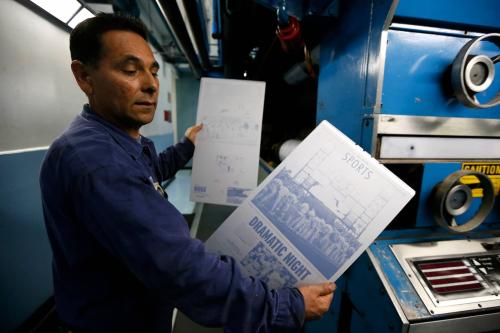Helen Thomas was famous for making waves when interviewing presidents. She was equally contentious about White House journalists when we interviewed her. A pioneering figure in American journalism, Thomas died Saturday at the age of 92. From 1978 through 2012 my Brookings interns and George Washington University students interviewed more than a thousand Washington journalists about their lives and careers for a series of seven books titled “Newswork.” This lively interview with Thomas was conducted by Riki Parikh on September 9, 2005.
Helen Thomas and I met at the Washington Bureau for Hearst Newspapers. The bureau is located on the tenth floor of the International Square office complex at 1850 K Street. Thomas and I met on Friday afternoon at 4 pm in a small conference room near the entrance. She told me as soon as I introduced myself “Don’t ask me any bio questions, you can find it all online.” She added, “And I’ve written three books.” She also informed me that Friday was her deadline day, so she wanted to be asked just the questions. The interview lasted exactly 30 minutes.
So how did you get into the reporting business?
All this is written. It’s just that I saw my byline in the high school paper and got hooked. [I] thought that that would be the profession I really wanted to follow.
You were a White House reporter for 57 years. Most people have the White House beat and then they get off of it. What made you stay?
What made them leave? What made me stay is because it’s the center – everything comes to the White House. All news that affects the country or the world comes through the White House so why not be in the center of it? There’s never a day without news, and it always affects this White House. I was interested in the news and that was the place to be.
When you first started out, there weren’t very many women at the White House.
Not too many. There were some and there have been women covering the news for 150 years, but there were not as many, of course, after – World War II was the turning point for more and more women got into it. And now, it’s a big profession for women. Journalism schools, there are almost more women than men. Like law, even.
Were you treated differently?
I think that once you get there and you’re doing your job, you’re basically on par. The press clubs were all closed to us, so you really had to struggle and to picket and do whatever we had to do to get into these clubs. That applied to most of the exclusive clubs in this town, they were all male. So, I think that was a real handicap for women reporters. Sure, there was still real discrimination all over the place with women in the profession, but a lot of the battle has been won, but there’s still a bit of a struggle.
What’s your favorite story that you covered?
Well, you can’t ask me that, because I’ve covered history every day. I covered – I wasn’t in Dallas, but I was in Washington – I covered the Kennedy funeral and the transition to the Johnson era. I covered Watergate, I covered the Iran-Contra scandal, Vietnam, how it affected the White House and across the country. Every major story that affected this country came through the White House, and I was writing about it from the Washington point of view and from the White House point of view.
Continue reading the full interview with Helen Thomas here »



Commentary
Helen Thomas is Famous for Interviewing Presidents. Here is an Interview with Her
July 23, 2013